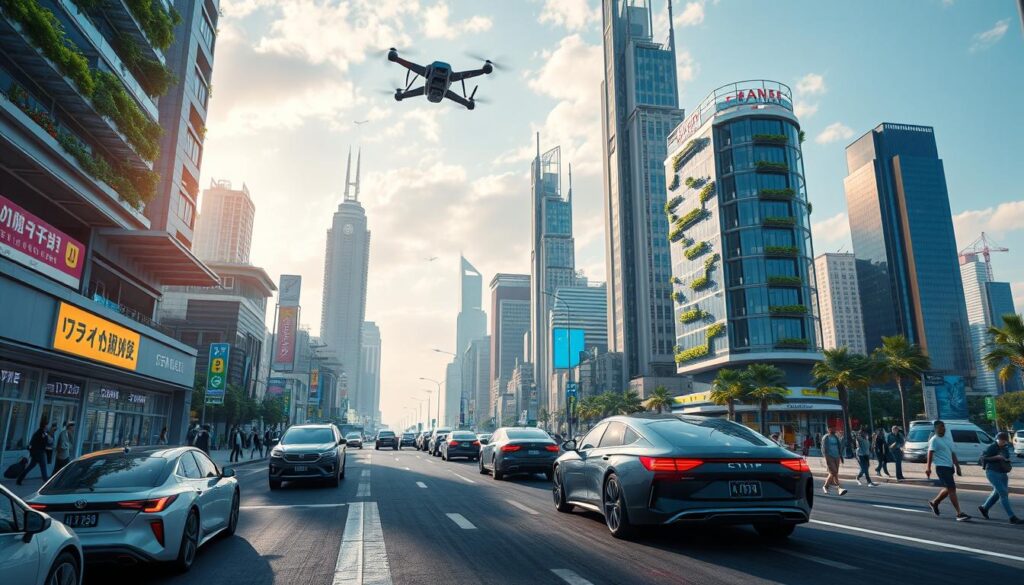In today’s fast world, technology is key to our daily lives. It changes how we do even simple tasks. Artificial intelligence (AI) and automation are leading this change. This article looks at how AI-powered automation is changing our daily routines. It makes tasks more efficient, streamlined, and smart.
Key Takeaways
- Discover how AI automation is transforming our daily lives, making once-tedious tasks more efficient and streamlined.
- Explore the various applications of AI automation, from streamlining business processes to enhancing productivity and enabling smart, intelligent solutions.
- Understand the remarkable ways in which this technology is revolutionizing our everyday routines and improving our overall quality of life.
- Learn about the benefits of AI-powered automation, including increased efficiency, improved productivity, and the ability to handle complex, repetitive tasks with ease.
- Gain insights into the future of AI automation and how it will continue to shape the way we live and work in the years to come.
What is AI Automation?
In today’s fast world, AI automation is changing how we do everyday tasks. It combines AI’s analytical power with automation’s efficiency. This lets us make many activities easier and more productive.
Understanding Artificial Intelligence and Task Automation
AI automation is all about using artificial intelligence to automate tasks. AI systems can think like humans, solving problems and making decisions. They use advanced algorithms and learning to get better over time.
The Benefits of AI-Powered Automation
The perks of AI-powered automation are many. Here are some:
- Increased efficiency: AI automation does tasks faster and better than humans, saving time and resources.
- Improved accuracy: AI can handle huge amounts of data with high precision, cutting down on mistakes.
- Enhanced productivity: By automating routine tasks, AI lets people focus on creative and strategic work.
- Cost savings: Automated processes can cut costs by reducing the need for manual labor and streamlining operations.
As artificial intelligence automation grows, we’ll see even more exciting uses and benefits in the future.
How AI-Powered Automation is Revolutionizing Everyday Tasks
The rise of AI-powered automation has changed our daily lives a lot. It makes routine tasks easier and more efficient. This technology is changing how we handle everyday challenges.
AI automation is making household tasks easier. Smart home devices, powered by AI, can do things like schedule laundry and control lights. This saves us a lot of time and effort.
Also, AI is revolutionizing everyday tasks by offering personalized help. Digital assistants can manage our schedules and suggest the best routes for our commutes. This boosts our productivity and makes life more convenient.
| Task | How AI Automation Helps |
|---|---|
| Laundry Management | Smart home devices can automate laundry scheduling, optimizing water and energy usage. |
| Personal Task Assistance | Digital assistants can manage schedules, set reminders, and provide personalized recommendations. |
| Commute Planning | AI-powered navigation apps can suggest optimal routes, account for traffic, and provide real-time updates. |
As AI-powered automation keeps getting better, we’ll see more ways to make our lives easier. It will help us focus on what’s important.
Streamlining Business Processes
In today’s fast-paced world, businesses are turning to AI-powered automation to make things more efficient. This lets them automate tasks that take up a lot of time. This way, employees can focus on important tasks that help the business grow.
Automating Repetitive Tasks
Business process automation is great for getting rid of boring, time-wasting tasks. AI can handle tasks like data entry, invoicing, and even HR work. This means less chance of mistakes and more time for employees to do important work.
Enhancing Efficiency and Productivity
By automating repetitive tasks, businesses get a lot more done in less time. Automated workflows make things run smoother and faster. This leads to happier customers, quicker service, and a business that can adapt quickly.
“AI-powered automation has been a game-changer for our business, allowing us to streamline our operations and focus on strategic priorities that drive growth and innovation.”
As more businesses use AI-powered automation, they see big benefits. They get more efficient, productive, and save time. With the right approach, companies can really benefit from this technology and set themselves up for success.
Intelligent Process Automation (IPA)
Automation is evolving, and a new concept has emerged – Intelligent Process Automation (IPA). IPA combines artificial intelligence (AI), machine learning, and cognitive technologies. It automates complex, decision-making processes, unlike traditional automation.
IPA can adapt to changing conditions and make smart decisions. This changes how we do everyday tasks. It’s a game-changer.
At its core, IPA analyzes and understands workflows, patterns, and relationships. AI and machine learning help IPA find ways to improve processes. It makes decisions that boost efficiency and productivity.
This automation saves time and reduces errors. It lets organizations focus on strategic, high-value tasks.
IPA is adaptable, unlike traditional automation. It can adjust to changes and make real-time decisions. This is crucial in fast-paced environments.
Intelligent process automation is changing how we tackle tasks. It automates complex processes, optimizes supply chains, and enhances customer service. AI-driven process automation brings efficiency, productivity, and agility to organizations.
| Key Features of Intelligent Process Automation (IPA) | Benefits of Intelligent Process Automation (IPA) |
|---|---|
|
|
“Intelligent Process Automation is the future of automation, empowering organizations to achieve new levels of efficiency and agility in an ever-changing business landscape.”
Robotic Process Automation (RPA)
Robotic Process Automation (RPA) is changing how businesses handle routine tasks. It uses software robots, or “bots,” to do tasks like humans do. This makes tasks faster, more accurate, and consistent.
What is RPA?
RPA lets companies use software to automate tasks. It can handle tasks like processing transactions and communicating with systems. This frees up people to do more important work.
RPA Use Cases and Applications
RPA helps many industries, like finance and customer service. It makes tasks like data entry and customer support easier. This boosts efficiency and saves costs.
- Data entry and extraction
- Invoice processing and payment management
- Onboarding and employee onboarding
- Order and claim processing
- Customer service and support
- Financial reporting and audit tasks
By automating these tasks, companies get better and faster. This leads to cost savings and a better customer experience.
| Industry | RPA Use Cases |
|---|---|
| Finance and Accounting | Invoice processing, accounts payable, financial reporting, audit tasks |
| Human Resources | Employee onboarding, payroll processing, leave management |
| Customer Service | Order processing, claims management, customer inquiries |
| Supply Chain and Logistics | Inventory management, order fulfillment, shipment tracking |
As more companies use RPA, they can change how they work. RPA is a big step in making businesses more efficient and competitive.
AI-Driven Workflows
The rise of AI-driven workflows has changed how we manage our daily tasks. By using AI-powered automation, we can now make smarter decisions and work more efficiently. This includes better task prioritization and teamwork between humans and machines.
At the core of this change is AI automation in workflows. AI uses advanced algorithms to analyze data and make decisions. This makes our work processes more efficient and gives us more time for creative tasks.
AI-driven workflows are also very adaptable. They can adjust tasks and resources as needed. This keeps our workflows flexible and ready for new challenges.
AI also helps us work better with machines. It combines AI’s speed and accuracy with our creativity and problem-solving skills. This way, we get the best of both worlds.
As we keep using AI-driven workflows, we’ll see big changes in our daily lives. We’ll work more efficiently, make better decisions, and be more innovative.

“AI-driven workflows are not about replacing humans, but about empowering them to work smarter and more efficiently.”
| Key Benefits of AI-Driven Workflows | Characteristics |
|---|---|
|
|
Cognitive Automation
In today’s fast-changing world, cognitive automation is a game-changer. It uses artificial intelligence (AI) and machine learning. This tech does more than just automate tasks. It handles complex, knowledge-based tasks that humans used to do.
Understanding Cognitive Automation
Cognitive automation, or AI-powered cognitive automation, is a big step up. It uses advanced AI and natural language processing. This lets it analyze lots of data, spot patterns, and make smart choices quickly.
It’s different from old automation, which just follows rules. Cognitive automation can change with new situations, learn from past experiences, and get better at making decisions.
Cognitive Automation in Action
In many fields, cognitive automation is changing how businesses work. It makes customer service faster and financial analysis easier. This tech helps organizations solve complex problems and work more efficiently.
“Cognitive automation is the future of business process automation, empowering organizations to tackle complex challenges with unparalleled accuracy and agility.”
As more companies want AI-powered cognitive automation, they’re using it to stay ahead. It helps them improve operations and find new ways to grow and innovate.
Smart Automation Solutions
The digital world is changing fast, and we need better automation solutions. Luckily, smart automation solutions powered by AI and machine learning are making a big difference. They’re changing how we do everyday tasks.
These new technologies bring together advanced features for smart automation. They help in many areas, from making work easier to improving our daily lives. AI-powered automation solutions are changing how we work and live.
Intelligent Process Automation (IPA)
Intelligent Process Automation (IPA) is a big step forward in smart automation. IPA uses AI and machine learning for complex tasks. It’s smarter than old automation methods.
- IPA can look at data, find patterns, and make smart choices. This makes work flows better and business operations more efficient.
- IPA can handle messy data and change with new situations. It keeps getting better over time.
- In many fields, IPA is making things more efficient, cutting down on mistakes, and improving customer service.
Robotic Process Automation (RPA)
Robotic Process Automation (RPA) is also key in smart automation. RPA uses software robots for tasks that need to be done over and over. This lets people focus on creative and strategic work.
| RPA Use Cases | Benefits |
|---|---|
| Data entry and extraction | Increased accuracy and consistency |
| Invoice processing | Improved productivity and efficiency |
| Customer service inquiries | Enhanced customer satisfaction |
As more people use smart automation solutions, we’ll see more benefits. Businesses and individuals will enjoy more productivity, fewer mistakes, and smoother work flows. The future of AI automation is here, and it’s changing our daily tasks.

The Future of AI Automation
The future of AI automation is exciting and full of possibilities. New technologies like machine learning and natural language processing will lead to big changes. These advancements will change how we automate tasks.
Humans and AI systems will work together more in the future. Instead of replacing people, AI will help them do their jobs better. This partnership will make work more efficient and productive.
Intelligent Process Automation (IPA) and Robotic Process Automation (RPA) will become common. These tools will make tasks like customer service and data analysis easier. They will also improve how we manage inventory and supply chains.
But, there are big questions about the impact of AI on society. We need to think about jobs, privacy, and how to use AI responsibly. These issues will shape the future of AI automation.
“The future of AI automation is not about replacing humans, but about empowering them to focus on higher-value, more fulfilling work.”
Despite these challenges, AI automation has a lot to offer. It will make our lives easier by taking over routine tasks. This will let us focus on more creative and strategic work.
| Key Trends in the Future of AI Automation | Impact |
|---|---|
| Increased Human-AI Collaboration | Enhanced efficiency and productivity through the complementary strengths of humans and machines |
| Widespread Adoption of IPA and RPA | Streamlining of everyday tasks and business processes |
| Advancements in Cognitive Automation | Improved decision-making and problem-solving capabilities |
| Ethical and Societal Considerations | Addressing concerns around job displacement, privacy, and responsible development of AI-powered technologies |
As AI automation evolves, it will change our daily lives. We’ll see AI in everything we do, from work to leisure. The future of AI holds great promise for making our lives better and more productive.
Conclusion
AI automation is changing our lives in big ways. It’s making tasks easier and more efficient. This technology is bringing us into a new era of smart solutions.
This article has shown us how AI can make our lives better. It automates boring tasks, boosts productivity, and makes workflows smoother. It’s making our work and personal lives more meaningful.
The future of AI looks bright. It will bring even more efficiency and convenience. By using AI, we can make our daily lives better, our work easier, and our lives more enjoyable.

